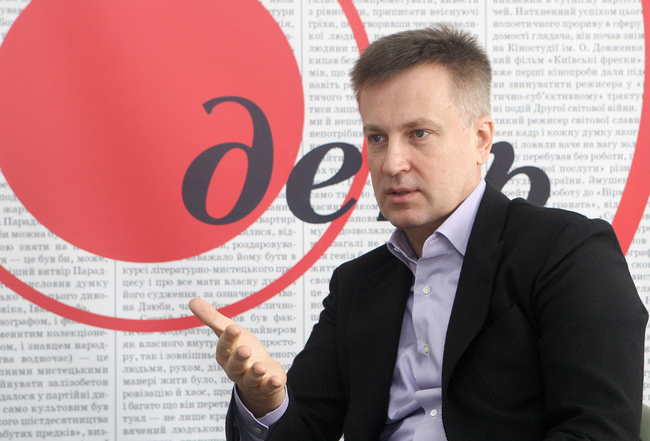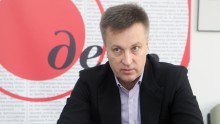After a number of searches all over the country and the Korban case, the impression is that politicians have a temptation to pull through a “Russian scenario” in Ukraine. But Russia has resources for this, while Ukraine depends on foreign borrowings. What is temptation after all? Why does the government need this? The answers come from The Day’s guest Valentyn Nalyvaichenko, twice chairman of the Security Service of Ukraine (SBU). Naturally, in the course of the interview, we also touched upon other issues, such as links between politicians and law-enforcement bodies, the consequences of the UKROP leader’s arrest, corruption in the government, visits to the Prosecutor General’s Offices, and the Gongadze-Podolsky case.
“THE KORBAN STORY OVERTLY DEMONSTRATES THE USE OF FORCE FOR THE PURPOSE OF INTIMIDATION”
The arrest of the UKROP party leader Hennadii Korban remains the past week’s top news. You have already responded briefly to this, saying that there is more politics than crime in this case. Why?
“Power should be exercised openly, especially in criminal proceedings against politicians. Every procedural action should be followed by briefings or public explanations for the political party to which this politician belongs as well as for all the people. The public importance of such procedural actions as a search or the arrest of a politician is much greater than in the case of other proceedings. I am saying this also on the basis of my experience, for after the murder of an SBU officer, our counterintelligence arrested and turned over to the police the killer Gordeyev. We said publicly that we would investigate the misdeeds of a criminal grouping in Donetsk and Luhansk oblasts, which also has connections in Dnipropetrovsk oblast. MPs and military servicemen showed up for questioning, which we announced openly. Nobody made a sensation out of this or used the force. But the Korban story overtly demonstrates the use of force for the purpose of intimidation. This is an old-time approach. No one has the right to call an individual a criminal before a court hands down a ruling.”
You have already said that after the Euromaidan you had to restore the Alpha special unit with great difficulties. And now that you can see as many as 500 Alpha men being involved in a special operation in Dnipropetrovsk not against, say, separatists but against people who in fact repulsed the Russian aggression, what do you feel?
“In my opinion, Dnipropetrovsk saw a superfluous and demonstrative deployment of special units, which law-enforcement executives must explain. What was this done for? For intimidation, which is a wrong thing to do. It was enough to use the police to restore law and order. They might have summoned Hennadii Korban – I don’t think he wouldn’t have shown up for questioning.”
“I AM FIRMLY CONVINCED THAT SBU REFORMS ARE BEING DELAYED”
The more so that he has been reporting for interrogations before.
“Yes, I confirm this.
“We, together with skilled instructors, trained a special counterterrorism unit for operations against terrorists, saboteurs, and groups of armed Russian mercenaries – but not for arresting suspects in one criminal case or another. I am firmly convinced that SBU reforms are being delayed. The proposals I made in March 2015 were clearly meant to prevent the Security Service from being used for a wrong purpose. The SBU must perform two functions only – counterintelligence and counterterrorism. Alpha has been charged until now with guarding participants in criminal law proceedings. But it is surely not the function of a special-purpose squad. The law does not envisage this. It is high time several local SBU departments were put together and made regional, as it was, for example, in the UPA – South, East, West, and Center. Not a single European special service conducts investigations or has anything to do with business activities – there are no such squads in them.”
Can we say that the Security Service is in fact involved in political “showdowns,” as it was early during the Kuchma and Yanukovych presidencies?
“The political leadership is always tempted to believe that the Security Service of Ukraine is ‘my’ law-enforcement body. For example, I am very much concerned over the SBU insider information that some dubious candidates for regional directorates are being interviewed not by Presidential Administration officials but by some Petro Poroshenko Bloc (BPP) ‘honchos.’ This is not normal – this is what the Party of Regions used to do. And we saw the ruinous result of this approach in February 2014. Let me say seriously that the whole security system crumbled at the time because Donetsk clan people were appointed as local SBU chiefs after being interviewed by Yanukovych’s ‘honchos.’ Unfortunately, life is teaching no lessons to the current leadership.”
“ONE AN A HALF YEARS HAVE PASSED, BUT THE PROSECUTOR GENERAL’S OFFICE NEVER MADE AN INQUIRY ABOUT BRINGING THE STOLEN ASSETS BACK TO UKRAINE”
Is there a danger today that oligarchs, who are now being actively harassed, will rally together and fund the events like those in February 2014?
“The danger is different – patriotic, volunteer, military, and many other protest-prone strata see no real changes in the country and feel strongly about corruption in the government. These people are capable of taking protest actions.
“I share Larysa Ivshyna’s opinion that there is now a Party of Collaborationists and a Party of Resistance. But one can resist radically – with weapons in hand, for people have gone through war, they are well-trained, and they know what it means to lose their comrades-in-arms. And this resistance movement will be aimed against not only the foreign aggressor, but also corruption, governmental arbitrariness, excessive involvement of special services, etc. On their part, collaborationists tend to make deals with oligarchs, redistribute the country’s wealth among a narrow circle of people, and get enriched at the expense of others. Instead of carrying our reforms, they offer offices to their own people who will be giving ‘right’ instructions.

“Undoubtedly, the prosecutor general himself could not say that he has no evidence of a ‘Russian connection’ in the Euromaidan events. He received this command ‘from above.’ Just think of it: those who are being summoned for questioning are not Surkov, who has not even been sued as a suspect, but the people who say the Kremlin was implicated in the Maidan tragedy! At the end of these interrogations, officials say they will take and look into the materials. This means it is collaborationism.
“But we won’t let collaborationists say we have no corruption. As long ago as March 2014, some Western ambassadors and foreign ministers visited the SBU. Why? Because, thanks to them, we drew up a list of Yanukovych’s henchmen. European prosecutors froze these people’s assets in banks. A year and a half have passed since then, but the Prosecutor General’s Office (GPU) never made an inquiry about bringing the deposited assets back to Ukraine. All the money still remains on their accounts. Then Yanukovych and Portnov sued Ukraine. Portov even won his suit.”
What does your Prosecutor General’s Office interrogation look like?
“I tell the investigators that all letters signed by me as SBU chief were exclusively sent to the GPU. And it is not only about letters. Who arrested the Berkut riot policemen? The SBU did. And where are these Berkut men now? Our counterintelligence officers spotted and recorded the arrival of three groups of FSB officers and the Russian president’s aide Surkov and handed over the evidence to the GPU. Besides, we found witnesses who told us about the crimes. But now that the GPU is saying about the absence of a ‘Russian connection,’ does it mean that the witnesses testified for no good reason? One more example of collaborationism. In October we, Anticorruption Movement, took a BPP list in Dnipropetrovsk and compared it with that of the Party of Regions in the 2012 elections – the same people. Or take Dobropillia, Donetsk oblast. A month after I had left the SBU, a certain separatist, Aksionov, came back to Dobropillia and got registered as mayoral candidate. This is a crime that will have very grave consequences for the state’s territorial integrity. The aim of these elections was to cleanse the authorities and appoint new young people to governmental offices. Regretfully, this did not occur and we will feel the consequences very soon.”
“THE DEMAND TO DISMISS SHOKIN IS A WARNING TO THE PRESIDENT THAT THE SYSTEM HAS DECAYED AND NEEDS TO BE DISMANTLED AND REPLACED WITH A DIFFERENT ONE”
You are now off politics. What caused you to do so?
“I am also greatly disappointed and have a certain Rubicon to cross because I documented the crimes of corruption at the highest governmental level and demanded that lawbreakers be punished, but the found evidence disappears and criminal cases are being quashed. The people who work with me and risk their lives look at this and see that all their efforts are futile. So, the question is which political party I could join. Working as public activists all over the country, we have formed a nongovernmental organization, Anticorruption Movement. We are far more effective than governmental institutions, judging by the latest investigations into immense offshore schemes. Anticorruption Movement and the parliamentary anticorruption committee have urged the GPU to institute criminal proceedings. We have also turned to ambassadors of the foreign states on whose territories Ukrainian power-wielding criminals devised their offshore schemes. This applies to the current MPs who have no right to do any business. This is only the tip of the iceberg. An international inquiry is already underway.
“Whenever I hear that there are no results of the SBU’s work, I say that all our achievements – from Yanukovych to Kurchenko and his real estate abroad – were possible thanks to new SBU operatives – I emphasize new. But we did it in line with the law – we would gather, sign, and officially hand over information to the Prosecutor General’s Office. But, unfortunately, the GPU has not been turning these materials over to court for about a year.
“As for Viktor Shokin himself, we cooperated quite effectively from the very first day of his appointment. I can’t say there were any complaints. But when it came to more serious and high-profile corruption cases, we saw that no criminal proceedings were initiated.”
The public is demanding that Shokin be fired, but it is clear that replacing the prosecutor general will hardly impact the system. The problem lies deeper.
“It is a signal from Ukrainian society and the international community to, above all, the president. Officials with any name are a temporary phenomenon. Therefore, it is a clear message to the president that he should change the GPU leadership, for it is unable to carry out anticorruption investigations. It is, after all, a warning to the president that the system has decayed, does not work, and needs to be dismantled and replaced with a different one. One more example – sabotage over the appointment of an anticorruption prosecutor. How long can they drag their feet? With the Maidan’s second anniversary a few weeks away, I think the topmost leadership must give an account of what it has done.”







